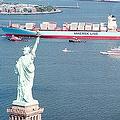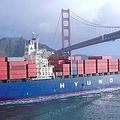 負責改善海事安全和預防船隻污染的聯合國國際海事組織(International Maritime Organization,IMO),10日無異議表決通過了一項要求大型遠洋船隻降低有害廢氣排放的規定。
負責改善海事安全和預防船隻污染的聯合國國際海事組織(International Maritime Organization,IMO),10日無異議表決通過了一項要求大型遠洋船隻降低有害廢氣排放的規定。
新規定於2010年7月1日生效,將要求船隻在指定的排放管制區域(Emission Control Areas,ECAs)內,使用含低硫化物(low sulfur fuel)含量的燃料,2010年將先實施第一期含硫量許可標準1.0%,至2015年再實施二期許可標準為0.1%。
在新的規定下,於2020年船隻所使用的燃料含硫化物不得超過5,000ppm,較目前全球排污總量減少90%。
這套排放管制區域硫化物標準的設立,是為了改善沿岸人口聚集地的空氣品質,主要由加州政府、美國聯邦政府、歐盟執委會和其他組織所倡議。
此外,IMO將實施新的引擎標準,嚴格地控管一氧化氮和懸浮微粒排放。新引擎標準於2011年起實施,將減少20%氮氧化物排放,待低排放認證配套工具上路後,新舊引擎都將適用新規。
 在防止船舶污染國際公約附錄六的修正案(MARPOL Annex VI amendments)通過後,國際海事組織秘書長密搓波羅斯(Efthimios Mitropoulous)發言表示這項成就為「國際海事組織歷史上一項巨大的決定,並再次證明本組織為一個聚焦、團結、重要的國際組織,有能力勝任處理議程上的所有項目,並在全球環境架構下制定全球標準的一個組織。」
在防止船舶污染國際公約附錄六的修正案(MARPOL Annex VI amendments)通過後,國際海事組織秘書長密搓波羅斯(Efthimios Mitropoulous)發言表示這項成就為「國際海事組織歷史上一項巨大的決定,並再次證明本組織為一個聚焦、團結、重要的國際組織,有能力勝任處理議程上的所有項目,並在全球環境架構下制定全球標準的一個組織。」
此項修正措施將對大氣環境和人類健康帶來意義深長且良性的影響力,特別是對於居住在海港城市和沿海社區的人口之健康。
代表超過全球海運生產力90%的世界海運理事會(World Shipping Council),對國際海事組織所制定的新國際船隻廢氣排放標準項的發佈、批準和實施,均表示支持。
世界海運理事會於今年4月份在國際海事組織公佈新規定大綱後經由聲明表示,「從洛杉磯到漢堡到東京,航運業認可對於新穎和有環境效率的船隻廢氣排放國際標準之需要,特別是硫氧化物,氮氧化物和懸浮微粒的排放。
世界海運理事會和它旗下的航運會員公司贊同美國政府於2007年6月針對此議題所提交給國際海事組織的提案。
針對停泊在美國各地超過上百座港口內的遠洋船隻,美國環保署表示超過40座的港口位於都會區,皆不符合聯邦空氣品質標準。為履行國際海事組織的所制定的新標準,美國環保署將會依據「清淨空氣法」(Clean Air Act)訂定相應的國內法。
當新標準全面實施後,由大型柴油動力遠洋船隻所排放的有害廢氣排放量將可減少80%,這也包括在美國水域內運作的外國船隻之排放量。
Regulations to reduce harmful air emissions from large ocean-going ships were unanimously adopted Friday by the International Maritime Organization, the United Nations specialized agency responsible for improving maritime safety and preventing pollution from ships.
Effective as of July 1, 2010, the new plan will require ships to use low sulfur fuel in designated Emission Control Areas - first reducing permissible sulfur levels to 1.0 percent in 2010 and then dropping the permissible sulfur level to 0.1 percent in 2015.
By 2020, ships will be required to use fuel with no more than 5,000 ppm sulfur, a 90 percent reduction from today's global cap.
This is an Emission Control Area sulfur level advocated by California, the U.S. government, the European Commission and others to address air quality issues in near-shore population centers.
Nitrogen oxides and particulate matter, or soot, also will be more strictly controlled.
New engine standards will cut NOx emissions by 20 percent and will apply to new engines and to existing engines, as certified low-emission kits become available, beginning in 2011.
Speaking following adoption of the MARPOL Annex VI amendments, IMO Secretary-General Efthimios Mitropoulos hailed the achievement as "a monumental decision in IMO's history, a decision that proves, once again, that the organization is focused, united and relevant as the international body capable of dealing with all items on its agenda, an organization that sets global standards in a global environment."
The revised measures are expected to have a significant beneficial impact on the atmospheric environment and on human health, particularly the health of people living in port cities and coastal communities.
The World Shipping Council, representing over 90 percent of the global shipping capacity, supports the issuance, ratification and implementation of the IMO's new international vessel air emissions standards established by the International Maritime Organization.
"From Los Angeles to Hamburg to Tokyo, the liner shipping industry has recognized the need for new, environmentally effective, international regulations for vessel air emissions, particularly SOx, NOx and particulate matter emissions," the World Shipping Council said in an April statement after the new regulations were outlined by the IMO.
The World Shipping Council and its liner shipping member companies endorsed the U.S. government proposal on this subject to the IMO in June 2007.
Ocean-going vessels dock at over 100 U.S. ports. The EPA says more than 40 of these ports are in metropolitan areas that do not meet federal air quality standards.
The EPA now will advance a domestic rulemaking action under the Clean Air Act to implement the new IMO standards.
When fully implemented, the new standards will help reduce harmful emissions by 80 percent or more from large diesel ships, including those that are foreign-flagged operating in U.S. waters
全文及圖片詳見:ENS





